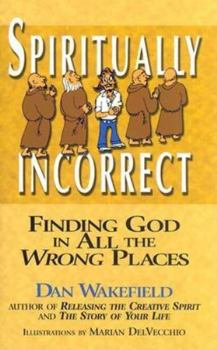Spiritually Incorrect: Finding God in All the Wrong Places
Select Format
Select Condition 
Book Overview
Breaks down the barriers that lie in the way of spiritual fulfillment, showing you that rules were made to be broken, and how it's possible-and imperative-for you to discover a rewarding spiritual life that fits your own personality, your own path.
Format:Hardcover
Language:English
ISBN:1893361888
ISBN13:9781893361881
Release Date:October 2003
Publisher:Skylight Paths Publishing
Length:192 Pages
Weight:0.88 lbs.
Dimensions:0.8" x 5.7" x 9.0"
Customer Reviews
1 rating
Brief, Thought-Provoking Words of Toleration
Published by Thriftbooks.com User , 20 years ago
Unlike other Dan Wakefield books, Spiritually Incorrect is a series of brief essays that have mostly appeared elsewhere (such as in his on-line column "Spiritually Incorrect" and in the New York Times Magazine, The Nation, Common Boundary, The Sun, Christian Century and Yoga Journal). As you might expect, the results are a little more quirky and unconnected at first blush. After thinking about what Mr. Wakefield had to say, I found myself seeing a deeper connection built around the themes of openness and tolerance that moved me. Having been a long-time fan of his writing, I had the good fortune of taking one of his creativity courses. While there, he told us about his classes and work in spiritual autobiography. The thought was a new one to me then, and I've continued to want to learn more about it. Since then, my spiritual development has greatly benefited from this idea, and from new lessons I learned about spirituality from my fellow classmates. I was most recently reminded of this when I spoke at my father's funeral, and experienced the event as a spiritual transition rather than as a loss of my beloved father. I was deeply grateful for the insights that led to my reaction.The book begins by explaining that there seems to be a parallel to political correctness in spiritual correctness -- you have to favor being poor, vegetarianism and professing only certain faiths. Mr. Wakefield, as the good writer he is, chooses to favor the dictionary definition of spirit in the book: "The animating or vital principle in humans (and animals); that which gives life to the physical organism, in contrast to its purely material elements; the breath of life."Spiritually Incorrect begins with a brief "Guide to Spiritual Incorrectness" that explains how Mr. Wakefield became aware of the phenomenon, and his spiritual journey. He was raised as an Eagle Scout Christian believer in Indiana, but became an intellectual atheist from his educational experiences. More recently, he has returned to Christian beliefs in a more general way. The most interesting part of this for me was how sharing his spiritual journey has helped others to begin theirs.The next section looks at examples of spiritual intolerance (being skeptical of hearing voices, wealth, comfort, women as ministers, relationships with pets, homosexuality, resisting other faiths than one's own, praying aloud, speaking on tongues and New Age practices) while praising other spiritual practices (such as the traditional coffeehouse hangout and considering nature).The third section surprised me. Mr. Wakefield looks at our spiritual relationship to our bodies . . . a relationship that he missed during much of his life. He considers that there are many roads to recovery from alcoholism, explains that he found antidepressants helpful, questions rigid vegetarianism, and supports finding greater spirituality through spa and Yogic practices. Mr. Wakefield's best work comes in a series of mini biographies o





